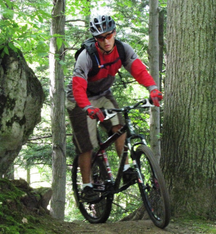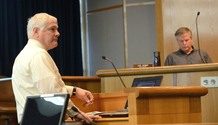
And what the DNR described was a surprisingly fresh approach that seemed considerably more flexible than the current "park preserve" proposal that could cost local taxpayers almost $6 million or more in coming years if 8,844 acres of DNR forest around Lake Whatcom are taken out of production and "reconveyed" to the county by the state for a "park."
DNR's recreation methodology is interesting; it's forest-based to begin with. The approach has evolved over time and it's proven. DNR recreation has been demonstrably successful in other areas. The officials explained that they could move quickly to make Whatcom County a high-priority recreation area. The presenters described how productive forests could expand the recreation economy while still meeting DNR's production goals. Of course, this would not only keep local coffers full but help the county meet its GMA mandate to conserve productive forestry just as the GMA seeks to conserve productive agriculture.
DNR's planning process relies on local input and transparency. A planning schedule was shown that illustrated how the process works; typically it takes only about two years to complete. The approach is to identify popular local activities and match them to a forest's attributes and landscape plan, habitat conservation plan, and harvest schedule. In this way, the best spots for hiking, camping, and fishing are identified along with prime places for specialized uses. DNR would accommodate active mountain biking, horseback riding, hunting and even off-road vehicles (ORV's) in separate zones because the agency understands the pitfalls that "multiuse" trails present. While the agency would continue to manage operations and risks, recreation would be closely coordinated with local governments.

Expect an uptick in drama over the next few weeks; watch for more head over heels reports like this article in the Bellingham Herald that portrayed a DNR-rec plan as something that would set things back for years. Would it? Park Director McFarlane has always flat-out refused to produce a tangible plan until deeds to all this property were firmly in the county's grip. What's to "set-back"?
Right off the bat, a DNR-recreation plan would save significant time plus a small fortune in legal expenses because no deeds would need to be changed, no tower leases transferred, and no forester hired. No roads would have to be removed, and a tremendous amount of staff expense would "go poof." In almost every respect, a DNR-recreation alternative would probably move faster and achieve a wider range of recreational opportunities than "park" plans. But the Parks Department would need firm leadership (if not a swift kick) to make a sea-change. There's the rub.
There's good cause to believe that common sense has been damned for the worst reasons - principally, politics. It's an election year, and "the reconveyance" is perceived (wrongly, WE think) as some kind of prize that will look good listed on shiny campaign mailers. Rumor has it that at least one wannabe candidate thinks this is the key to the kingdom. Think again. When water quality improvements don't materialize (they won't) and park bills start racking up, you'll find yourself (or selves) in a very bad position with a practical and political albatross around your neck - some legacy. This council and the Executive could be downright heroic and leave nobody behind. But with Titanic institutional momentum chugging along, voting "no" would take courage. People do recognize and vote for courageous statesmen.
To keep this debate as broad as possible, to balance the ridiculous "save the lake" slant that this story is getting virtually everywhere else (the "epic opportunity to lose" line is entirely untrue, and council knows it) - consider this latest appeal from these two sincere forestry leaders:
Dear Friends of Working Forests, February 28, 2013
We have possibly a last opportunity to convince the County Council that the Reconveyance of 8,844 acres, of trust lands managed under the Lake Whatcom Landscape Plan, to Whatcom County for a low impact park is not in the best interest of our fellow citizens. The council will hold a second Public Hearing starting at 6:00 pm on Tuesday March 12 in the council chambers. At the last hearing we had a great turn out and the Council did delay their decision. Once again we need you and anyone else that feels this proposal is not considering the best interest of the taxpayers, to show up at the hearing and consider speaking to the council. The following talking points are here to give you ideas for a short letter to the council and possible testimony. The proponents of this “taking” have been actively sending form letters and will be at the hearing in force. Please write a letter and attend the public hearing to give the council you thoughts. Feel free to send this on to your friends.
SOME RECONVEYENCE TALKING POINTS
1. The magnitude of this park is more than what is acceptable by the Growth Management Act The Growth Management Act specifically protects Commercial Forest land. The withdrawal of this land is in direct conflict with GMA. Whatcom County and the City of Bellingham continue to participate in the conversions of forestlands to preservation status.
2. Leaving the proposed reconveyed lands under DNR management is a zero loss to all parties. Under county management it is a net loss economically and continues the trend of a dwindling forestland base that threatens, the already raw material stressed, timber industry infrastructure. For the last 35 years the timber industry has lost over 60% of its timber base. Less than 25% of Whatcom County forests are available as “working forests”. Logs are imported from Canada and must be trucked longer distances to supply mills in Washington. Taking more timber out of the forest base will impact an important industry and associated businesses.
3. The Landscape Management Plan gave local control to Whatcom County. Proponents say that reconveying this land to the county will give local control. The Legislation that formed the Landscape Management Plan on DNR managed Trust lands in the watershed was asked for and developed by local activists, then approved by the City of Bellingham, Whatcom County, and Water District #10. The ink hardly dried on this plan, when the same activist groups began the next step for reconveyance. This type of planed incromentalism must stop here. What lands will be next? Will a Whatcom Land Trust conservation easement take control of this land as they have with other forestlands?
4. Specific agreements must be made before reconveyance is passed; this process has been void of facts and not fully vetted. Now proponents are talking about a forest management plan that will harvest as much timber as called for in the Landscape Management Plan. This is a smoke screen, if a written agreement spelling out exactly how the lands will be used is not done before reconveyance is passed, it will never happen. No firm park plan or plan to maintain this area has been given. The parks department can’t even keep the one latrine at the Ken Hertz trailhead maintained, how do we expect them to keep a bigger facility operating on only $150,000.00 a year?
5. Dept. of Ecology representatives have stated that reconveyance would not result in any measurable improvement to water quality. The phosphorous pollution in Lake Whatcom is in basins 1 and 2, that are heavily urbanized and mostly under the City of Bellingham and Whatcom County’s jurisdiction. Basin 3 receives mostly forest runoff and is still clean. Why are we demonizing forest practices that are a preferred land use and cause little impact on the Lake? The limited timber harvesting (revenue creation) allowed under the Landscape Plan does not need to be eliminated to maintain clean water.
6. A full economic analysis of the reconveyance must be made before a vote. Especially during these economic hard times, how can the County Council approve this proposal and not know the full economic impacts? Far too many times we move ahead on projects not understanding the unintended consequences of our actions. The county needs to do an independent economic analysis.
7. Currently there is a large amount of low impact recreational use in the proposed reconveyance area. The Department of Natural Resources allows hiking, biking and horseback riding on the lands they manage. What will change under reconveyance? Do we want low impact recreation or a park to draw more users to the watershed? An inventory of existing recreation use has not been done, so we do not have a baseline for future proposals. From this baseline future rational decisions are made, without a baseline it is just speculation. If the 8,844 acres is left in the hands of DNR timber management, existing recreation could be enhanced as directed by the Landscape management Plan (Objective 19). A recent meeting with DNR officials revealed their willingness to consider a recreation plan for Whatcom County. Instead of reconveying this property and having all the cost being the county taxpayer’s responsibility, a shared effort with the state will have many more benefits for everyone.
8. The urban society must learn how to live with the rural society and realize the benefits that come from understanding and cooperation. In other words, stop being so selfish and self absorbed. Start to understand your rural neighbors. We love the Earth as much as you and we want a wonderful future for our children also. We have committed our lives to the land; don’t you think we care for it as much as you do? Maybe because we are so close to the land we may know more of how to take care of it and use it wisely, not selfishly.
9. We can have recreation and forest management at the same time, while providing revenue to the county and not the cost to maintain these 8,844 acres. Why do we need to reconvey for a single use Park? These trust lands can produce an estimated $ 500,000 annually revenue for the county beneficiaries, plus a 5 fold benefit to the local economy. Cooperation between Whatcom County and DNR can create a “working forest” for all.
Dick Whitmore and Tom Westergreen

 RSS Feed
RSS Feed
